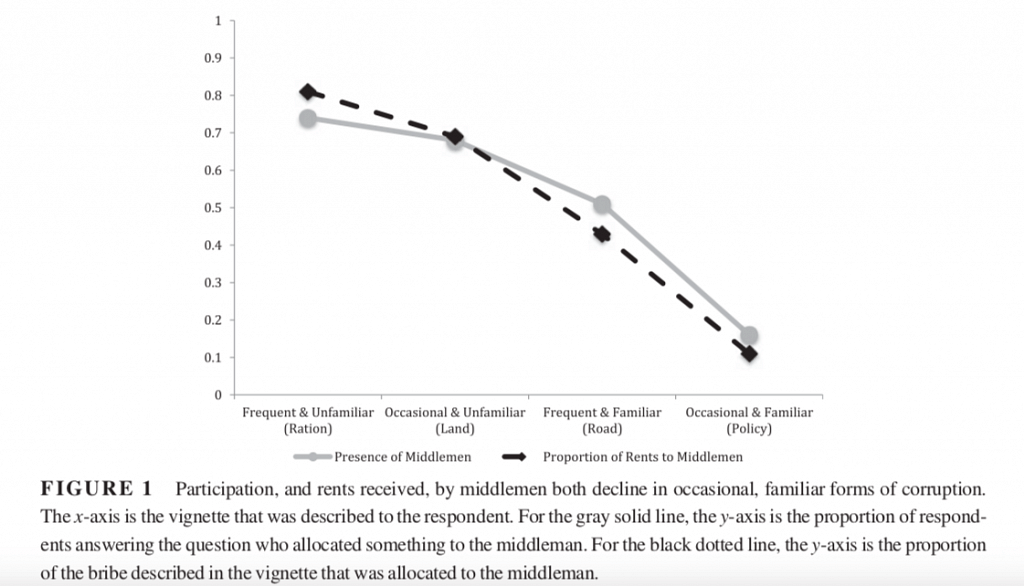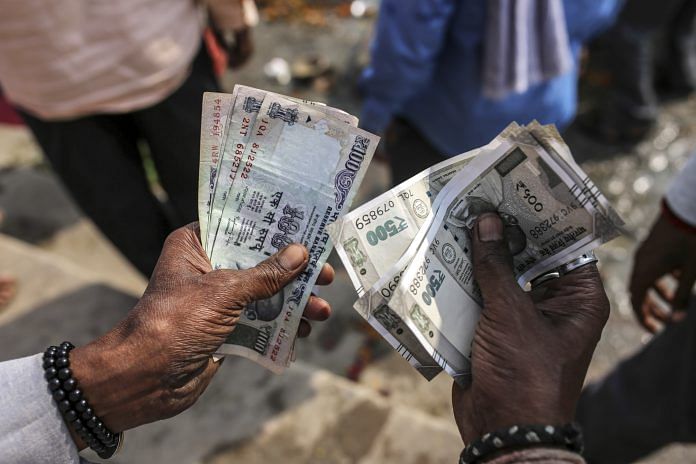A key ingredient in corruption is the middlemen. But there is little understanding of what conditions make their role important to corrupt transactions.
Cross-national studies estimate the economic cost of bribery at nearly $2 trillion, or 2 per cent of global domestic product. In India, more than half of all households are estimated to have paid a bribe to acquire public services at some point. But how corrupt transactions actually occur is not so obvious.
One of the key ingredients in corruption in developing countries like India is the presence of middlemen. Yet, there is little understanding of whether middlemen are always important to corruption and, if not, the conditions under which they may play a role. Recent theoretical work suggests that middlemen can be vital and minimise transaction costs and trust dilemmas. Simply put, middlemen increase the feasibility of corruption. Others note that an intermediary may bring efficiency but also increases agency costs.
I began looking at the role of middlemen in corrupt transactions as a lens into the industrial organisation of corruption. What are the conditions under which the agency costs of middlemen are overwhelmed by the benefits of solving information and trust dilemmas that might otherwise limit the feasibility of illicit transactions? When middlemen do play a role, are they crucial actors who can extract a large portion of the illicit gains, or only minor players who collect the crumbs of a transaction? Does the answer to this question differ depending on the type of corruption under consideration?
Also read: To make more Indians drink their whiskey, US giant Jim Beam bribed govt officials
While theories of middlemen to date have highlighted their role, they have not considered the specific conditions under which they are likely to be relevant to a corrupt transaction.
Information gap and frequency
Potential middlemen can collect valuable information about many characteristics of a corrupt act, including the nature of bureaucratic processes, the specific individuals willing to be bribed and to what ends, and the amounts of money required to attain those ends. Sometimes, similar bribes are paid to the same individuals for the same ends repeatedly over time such as extra payments to receive a driver’s license without passing the driving test. A middleman can gain the necessary knowledge to facilitate such transactions, making him valuable to both individuals paying and receiving bribes. The frequency of transactions can thus increase the quality of an intermediary and the efficiency with which they can make a match.
Frequency could, however, also reduce the demand for middlemen. If the individuals paying and receiving bribes repeat a transaction over time, then there becomes less need for the middleman—the briber and bribed could develop their own trusting relationship and eventually exclude the middleman from the transactions.
As a result, a middleman will be most relevant and valuable where transactions are frequent, but one party remains the same and the other, either briber or recipient, changes with each deal.

Survey findings
To examine the role of middlemen in different forms of corruption, I administered a survey experiment to a large sample of politicians and bureaucrats at nearly all levels of office in India – from village, block, and district elected councils, to state and national legislative constituencies. I asked respondents what portion of a bribe would be allocated to a range of different individuals, including middlemen, and varied the goal for which the bribe was being paid: acquiring a ration card, modifying a land record, acquiring a contract to build a road, or influencing an industrial policy.

Respondents allocated rents to a middleman 57.0 per cent of the time. This clearly suggests that middlemen may play an important role in corruption, but there is variation in the perception of this role and middlemen are not a determinative link in the corruption chain in all cases. In addition, middlemen were allocated 60.4 per cent of the bribes overall, suggesting that when they do participate in corrupt acts, they often have the leverage to extract substantial portions of the illicit rents.
Also read: What Indian voters buy with ‘bribes’ just before elections: Booze, good food & clothes
Middlemen receive a much larger proportion of rents from frequent, unfamiliar corruption than from occasional, familiar corruption. Figure 1 shows the proportion of rents allocated to middlemen declines in a similar manner as the participation of middlemen, as we move from frequent, unfamiliar forms of corruption to more occasional, familiar forms.

Anti-Corruption efforts
Corruption is widely recognised as a problem of the political economy across developing countries. Yet, anti-corruption efforts can also result in higher levels of corruption, as some scholars have suggested.
Governance and transparency initiatives, for example, may reduce opportunities for discretion in service delivery, but if citizens nonetheless experience long delays in receiving services, they may still have an incentive to seek out intermediaries for assistance.
Relatedly, anticorruption efforts that focus on reducing the incentives for corruption by increasing bureaucrat salaries do not take into consideration the incentives of citizens or the intermediaries. Middlemen may actually be the most important actors for perpetuating corruption, because their livelihoods depend on it. Citizens and middlemen with an interest in corruption may then pressure bureaucrats to continue their corrupt acts, even at higher salary levels.
Also read: Why the anti-corruption bill has drawn so much criticism
Policy makers may be advised to devise strategies that better acknowledge the full set of actors engaged in corrupt acts. Apart from measures to improve citizen access to services and bureaucrat salaries, the lack of attractive legal employment options for intermediary must also be considered.
The author is an assistant professor of political science and public policy at the University of California, Berkeley. This is an edited extract from her article titled ‘When do middlemen matter? Evidence from variation in corruption in India’, published in the July issue of Governance Journal.




the middle men are a must in india because ordinary persons dont know the intricacies of the power rule based spiders web functioning inside the building where babbos are seated–their attitude towards those who come directly to them is rude and over bearing. middle menalso save the babbos from being caught because the money is delivered at a later date a